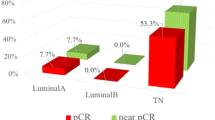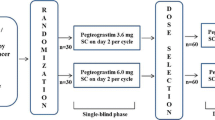Abstract
Objective: To assess the efficacy and safety profile of docetaxel, as a single agent, in the treatment of elderly patients with advanced breast cancer.
Methods: Twenty-eight patients, with a median age of 72 (range 66–84) years, were included in the study and received docetaxel (50–100 mg/m2) every 3–4 weeks as first- or second-line treatment of advanced breast cancer. Granulocyte colony-stimulating factor (G-CSF) was administered as primary prophylaxis in 97% of cycles.
Results: The overall response rate was 50% (95% CI 32, 69). The median time to disease progression was 10.7 months (95% CI 10.0, 11.5), and the median overall survival was 26.6 months (95% CI 16.6, 36.7). Neutropenia was the most frequent grade 3/4 toxicity (18% of patients and 5% of cycles). There was just one case of febrile neutropenia that resulted in toxic death. Severe neutropenia only occurred in patients who did not receive G-CSF support from the start of the study treatment. Vomiting was the most frequent grade 3/4 non-haematological toxicity (11% of patients and 2% of cycles).
Conclusion: Docetaxel as a single agent is active in elderly patients with advanced breast cancer. The use of prophylactic G-CSF allowed the administration of high doses of docetaxel with minimal myelosuppression.






Similar content being viewed by others
Notes
The use of trade names is for product identification purposes only and does not imply endorsement.
References
Kimmick GG, Balducci L. Breast cancer and aging: clinical interactions. Hematol Oncol Clin North Am 2000; 14: 213–34
Alberg AJ, Singh S. Epidemiology of breast cancer in older women: implications for future healthcare. Drugs Aging 2001; 18(10): 761–72
Yancik R, Ries LA. Aging and cancer in America: demographic and epidemiologic perspectives. Hematol Oncol Clin North Am 2000; 14: 17–23
Balducci L, Extermann M, Carreca I. Management of breast cancer in the older woman. Cancer Control 2001; 8(5): 431–41
Muss HB. Breast cancer in the elderly: treatment of metastatic disease. Cancer Control 1995; 2 (2 Suppl. 1): 39–42
Nelson NJ. Trial data lacking for elderly patients with breast cancer. J Natl Cancer Inst 2000; 92(24): 1968–9
Hutchins LF, Unger JM, Crowley JJ, et al. Underrepresentation of patients 65 years of age or older in cancer-treatment trials. N Engl J Med 1999; 341(27): 2061–7
Crown J. Docetaxel: overview of an active drug for breast cancer. Oncologist 2001; 6Suppl. 3: 1–4
Oken MM, Creech RH, Tormey DC, et al. Toxicity and response criteria of the Eastern Cooperative Oncology Group. Am J Clin Oncol 1982; 5(6): 649–55
Ten Bokkel Huinink WW, Prove AM, Piccart M, et al. A phase II trial with docetaxel (Taxotere) in second line treatment with chemotherapy for advanced breast cancer: a study of the EORTC Early Clinical Trials Group. Ann Oncol 1994; 5(6): 527–32
Miller AB, Hoogstraten B, Staquet M, et al. Reporting results of cancer treatment. Cancer 1981; 47(1): 207–14
WHO. WHO handbook for reporting results of cancer treatment. Geneva: WHO offset publications, 1979: 48
Kaplan ZL, Meier P. Non-parametric estimation from incomplete observations. J Am Stat Assoc 1958; 53: 457–81
National Cancer Institute. Guidelines for the reporting of adverse drug reactions. Bethesda (MD): Division of Cancer Treatment, National Cancer Institute, 1999: 1–80
Diab SG, Elledge RM, Clark GM. Tumor characteristics and clinical outcome of elderly women with breast cancer. J Natl Cancer Inst 2000; 92(7): 550–6
Satariano WA, Ragland DR. The effect of comorbidity on 3-year survival of women with primary breast cancer. Ann Intern Med 1994; 120(2): 104–10
Christman K, Muss HB, Case LD, et al. Chemotherapy of metastatic breast cancer in the elderly: the Piedmont Oncology Association experience. JAMA 1992; 268(1): 57–62
Hainsworth JD, Burris 3rd HA, Yardley DA, et al. Weekly docetaxel in the treatment of elderly patients with advanced breast cancer: a Minnie Pearl Cancer Research Network phase II trial. J Clin Oncol 2001; 19(15): 3500–5
Frontini L. An interesting antitumor drug in elderly patients over the age of 70: weekly docetaxel. Tumori 2002; 88 (1 Suppl. 1): S41–3
Marty M, Extra JM, Cottu PH, et al. Prospects with docetaxel in the treatment of patients with breast cancer. Eur J Cancer 1997; 33Suppl. 7: S26–9
Figgitt DP, Wiseman LR. Docetaxel: an update of its use in advanced breast cancer. Drugs 2000; 59(3): 621–51
Extermann M, Chen H, Cantor AB, et al. Predictors of tolerance to chemotherapy in older cancer patients: a prospective pilot study. Eur J Cancer 2002; 38(11): 1466–73
Balducci L, Corcoran MB. Antineoplastic chemotherapy of the older cancer patient. Hematol Oncol Clin North Am 2000; 14(1): 193–212, x–xi
Balducci L, Lyman GH. Patients aged ≥70 are at high risk for neutropenic infection and should receive hemopoietic growth factors when treated with moderately toxic chemotherapy. J Clin Oncol 2001; 19(5): 1583–5
Acknowledgements
The authors acknowledge the assistance of Biométrica in the statistical analysis of the study, Prous Science SA for assistance with editing the article, and Aventis Pharma for general coordination of the project. The authors have no potential conflicts of interest that are directly relevant to the contents of this manuscript.
Author information
Authors and Affiliations
Corresponding author
Rights and permissions
About this article
Cite this article
Lorenzo, I., Constenla, M., Palacios, P. et al. Docetaxel as Single-Agent Treatment in Elderly Patients with Advanced Breast Cancer. Clin. Drug Investig. 25, 249–256 (2005). https://doi.org/10.2165/00044011-200525040-00004
Published:
Issue Date:
DOI: https://doi.org/10.2165/00044011-200525040-00004




